#priest prussia
Text
@pruktober
Day 2: Devil x Priest
"What if he truly does like me?" The thought came to Gilbert as a whisper.
"What if...he sticks around because he is in need of company?" There was more hesitation with this suggestion, and after taking a moment to process, Gilbert scowled over his shoulder to catch the owner of the voice moving from side to side, speaking into his ears and gesticulating melodramatically.
"What are you, my conscience? Someone of your kind hardly suits that role."
A toothy grin. "You could think of me as the devil on your shoulder."
Read the rest here.
#pruktober#hetalia#aph#hws#aph england#hws england#aph prussia#hws prussia#pruk#engpru#hws pruk#sweet devil#devil england#demon england#priest prussia
19 notes
·
View notes
Text
I would have forgiven all of JJ's sins if instead of that letter where he's like "I do not like you, Monsieur 😤" he just bullied V back. High road my ass?? Look where that got him? Living proof that you SHOULD stoop to their level
#doesn't matter if the rumors are real or fake. just say shit#forge letters#''Voltaire lied about his birthday because he just wants attention''#''Voltaire plagiarizes all his shit''#''Voltaire fucked the King of Prussia''#''Émilie cheated on him before she died. isn't that sad and pathetic''#''He got really sick once and begged a priest for his last rites''#''sodomite''#just say shit
25 notes
·
View notes
Text
Victor Hugo on Talleyrand's death
For @empirearchives who was interested, here's a translation of Victor Hugo's text about Talleyrand's death. My thanks to @microcosme11 for her help <33
Choses Vues, Victor Hugo
1838
Talleyrand
19th of May
In the Rue St-Florentin, there is a palace and a sewer.
The palace, with its noble, rich, and dull architecture, was long called "Hôtel de l'Infuntado"; today, we read on its front door: Hôtel Talleyrand. During the fourty years he lived on this street, the last host of this palace might never have set eyes on this sewer.
He was a stranged, feared, and considerable character: his name was Charles-Maurice de Périgord; he was noble as Machiavel, a priest like Gondi, defrocked like Fouché, witty as Voltaire, and lame as the devil. One could say that everything limped with him: the nobility which he had put to the service of the republic, the priesthood he had dragged on the Champ-de-Mars then threw down the drain, the marriage he had broken by twenty scandals and by a voluntary separation, the wit he dishonoured through vileness. This man, nevertheless, had grandeur.
The splendours of both regimes were mixed together inside of him: he was prince of the old kingdom of France, and prince of the French Empire.
For thirty years, from the depth of his palace, from the depth of his mind, he had just about led Europe. He had let the revolution call him "tu", and had smiled at it, ironically of course; but it had not noticed. He had approached, known, observed, pierced, stirred, upturned, delved into, mocked, intellectually fertilized all the men of his era, all the ideas of his century, and there had been a few minutes in his life when, holding in his hand the four or five fearsome threads that moved the civilized universe, he had had for a puppet Napoleon the First, Emperor of the French, King of Italy, Protector of the Confederation of the Rhine, Mediator of the Swiss Confederation. Such was the game this man played.
After the Revolution of July, that old race, whose grand chambellan he was, having fallen, he found himself standing on one foot and told the people of 1830, sitting, bare-armed, on a pile of cobbles: Make me your ambassador.
He had received Mirabeau's last confession and Thiers' first confidence. He had said himself he was a great poet and had made a trilogy in three dynasties: Act I, Buonaparte's Empire; Act 2, The House of Bourbon; Act 3, The House of Orleans.
He had done all of this in his palace, and, in this palace, like a spider in its web, he had attracted into it and taken successively heroes, thinkers, great men, conquerors, kings, princes, emperors, Bonaparte, Sieyès, Mme de Staël, Chateaubriand, Benjamin Constant, Alexander of Russia, Wilhelm of Prussia, Francis of Austria, Louis XVIII, Louis-Philippe, all the golden, shiny flies who buzzed in the history of those last fourty years. The whole sparkling swarm, fascinated by this man's deep eye, had successively passed under the dark door that bore, written on its architrave: Hôtel Talleyrand.
Well, the day before yesterday, 17 March, 1838, that man died. Doctors came and embalmed the corpse. For this, like the Egyptians, they first withdrew the bowels from the belly and the brain from the skull. Once done, after they had transformed the prince de Talleyrand into a mummy, and nailed this mummy in a white satin-lined coffin, they withdrew, leaving upon a table the brain, that brain which thought so many things, inspired so many men, built so many edifices, led two revolutions, fooled twenty kings, contained the world.
Once the doctors were gone, a valet entered, he saw what they had left. Hold on! they forgot this. What to do ? He remembered that there was a sewer in the street, he went there, and threw that brain into this sewer.
Finis rerum.
73 notes
·
View notes
Text
THIS DAY IN GAY HISTORY
based on: The White Crane Institute's 'Gay Wisdom', Gay Birthdays, Gay For Today, Famous GLBT, glbt-Gay Encylopedia, Today in Gay History, Wikipedia, and more … December 14

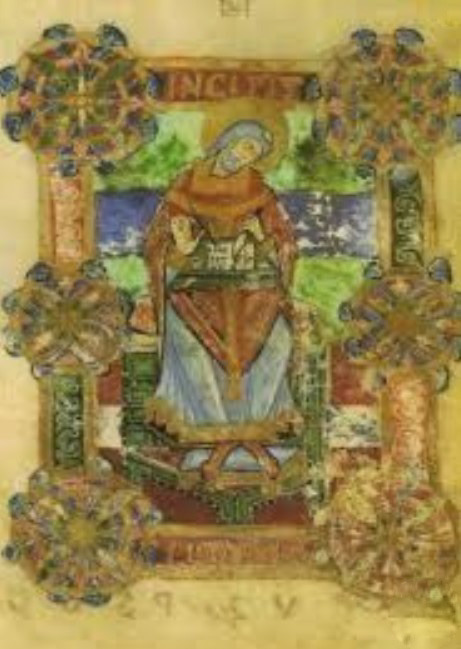
c.530 – Venantius Fortunatus (d.circa 600/609) was a Latin poet and hymnodist in the Merovingian Court, and a Bishop of the early Catholic Church. He was never canonised but was venerated as Saint Venantius Fortunatus during the Middle Ages.
Born in Treviso, near Ravenna in Italy, he spent his time as court poet to the Merovingians. After visiting the tomb of St. Martin of Tours at St. Hilary at Poitiers, he decided to enter a monastery.
He continued to write poetry, some of which have a permanent place in Catholic hymnody, for instance the Easter season hymns "Vexilla Regis" and the "Pange Lingua" (Sing, O my tongue, of the battle). Three or four years before he died he was made bishop of Poitiers. Although never canonized, he was venerated as a saint in the medieval church, and his feast day is still recognized on 14th December each year.
Like Paulinus of Nola, St Venantius's poetry also includes some decidedly secular verse of the romantic sort. That this celebrates male love is clear from its inclusion in the Penguin Book of Homosexual Verse.
"Written on an Island off the Breton Coast"
You at God's altar stand, His minister
And Paris lies about you and the Seine:
Around this Breton isle the Ocean swells,
Deep water and one love between us twain.
Wild is the wind, but still thy name is spoken;
Rough is the sea: it sweeps not o'er they face.
Still runs my lover for shelter to its dwelling,
Hither, O heart, to thine abiding place.
Swift as the waves beneath an east wind breaking
Dark as beneath a winter sky the sea,
So to my heart crowd memories awaking,
So dark, O love, my spirit without thee.
Fortunatus died in the early 600s. He was called a saint after his death, but was never formally canonized.


1791 – Today is the birthday of the Irish poet Charles Wolfe (d.1823). Born at Blackhall, County Kildare, Wolfe attended Trinity College, Dublin between 1809 and 1814 and was ordained as a Church of Ireland priest in 1817. He is remembered for his poem "The Burial of Sir John Moore after Corunna", written in 1816 and much collected in 19th and early 20th century anthologies.
Wolfe's sexuality is often disputed, many believe he was homosexual. He certainly had an extremely intense friendship with the Rev. Thomas Meredith for whom he wrote two gushing epithets. Wolfe died from tuberculosis caught from a cow at the age of 32. Yes. A cow. Even into the mid-20th century tuberculosis was commonly transferred via milk.

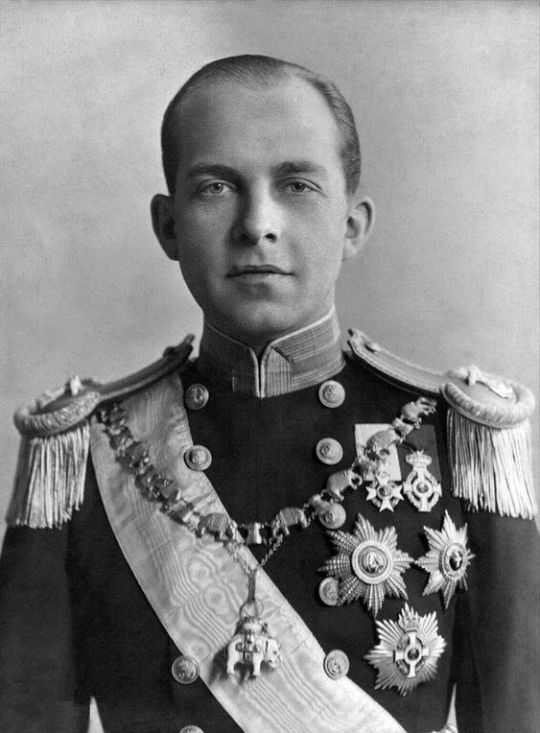
1901 – King Paul of Greece (d.1964) reigned as king of Greece from 1947 to 1964. He may have been bi-sexual.
Paul was born in Athens, the third son of King Constantine I of Greece and his wife, Princess Sophia of Prussia. He was trained as a naval officer. On 9 January 1938, Paul married Frederika of Hanover at Athens. They had three children.
Before his marriage he is alleged to have invited the homosexual literary muse, Denham Fouts, on a cruise of the Aegean Sea, perhaps because they were lovers. However, Fouts's friend John B. L. Goodwin said Fouts often made up stories about his life, and literary critic Katherine Bucknell thought many of the tales about him were myth.
During most of World War II, when Greece was under German occupation, he was with the Greek government-in-exile in London and Cairo. From Cairo, he broadcast messages to the Greek people.
Paul returned to Greece in 1946. He succeeded to the throne in 1947, on the death of his childless elder brother, King George II.


1951 – Today's the birthday of American actor and puppetteer Paul Zaloom. He's best known for his role as the character Beakman on the television show Beakman's World, based on the Universal Press Syndicate syndicated comic strip You Can With Beakman and Jax created by Jok Church.
Paul Zaloom was educated at The Choate School (now Choate Rosemary Hall) in Wallingford, Connecticut, and began his entertainment career at Goddard College with artists in residence the Bread and Puppet Theater, a troupe specializing in self-invented, home-made theater. One of their performance locations was Coney Island, where Zaloom is said to have given advice to the "unofficial Mayor of Coney Island", Dick Zigun, on how to bring in the crowds. In his solo work he utilizes found-object animation, in which he takes objects as varied as coffee pots and humidifiers and turns them into elements of political satire. His personal politics are liberal; he has referred to Elizabeth Dole and Margaret Thatcher as "right wing nut jobs." He has also been a fierce critic of U.S. foreign policy since the early 1980s, having helped to lead a disarmament march during the Cold War.
In 1992 Zaloom starred in the cable TV children's science program Beakman's World. The show moved to CBS in 1993 and aired for four seasons. Zaloom has also written, designed and performed eleven full length one-man shows, including Fruit of Zaloom, Sick But True, Mighty Nice, and The Mother of All Enemies, the latter a shadow-puppet show featuring traditional Middle-Eastern comic puppet character Karagoz. His latest effort tackles social issues such as privacy, the war on terrorism, and discrimination based on sexual orientation and ethnicity. Aside from shadow puppetry, Zaloom's idiosyncratic work utilizes techniques such as overhead projection, government document expose, cantastoria picture performance, toy theater, as well as hand, rod, found object, and dummy puppets.
Zaloom has described himself as "a Gay, Buddhist, agnostic, quaker, secular humanist knucklehead."

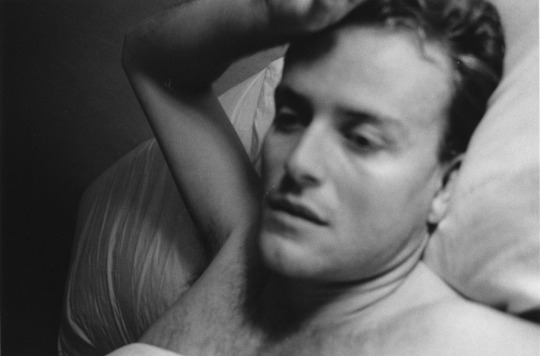
1955 – Hervé Guibert (d.1991) was a French writer and photographer. The author of numerous novels and autobiographical studies, he played a considerable role in changing French public attitudes to AIDS. He was a close friend and lover of Michel Foucault.
Guibert was born in Saint-Cloud, Hauts-de-Seine, to a middle-class family and spent his early years in Paris, moving to La Rochelle from 1970 to 1973. In his teens Hervé Guibert lied about his age to work at the magazine 20 ans eventually leading to a job with Le Monde. After working as a filmmaker and actor, he turned to photography and journalism. In 1978, he successfully applied for a job at France's prestigious evening paper Le Monde and published his second book, Les aventures singulières (published by Éditions de minuit). In 1984, Guibert shared a César Award for best screenplay with Patrice Chéreau for L'homme blessé. Guibert had met Chéreau in the 1970s during his theatrical years.
Guibert's writing style was inspired by the French writer Jean Genet. Three of his lovers occupied an important place in his life and work: Thierry Jouno, director of an institute for the blind whom he met in 1976, and which led to his novel Des aveugles; Michel Foucault, whom he met in 1977; and Vincent Marmousez, a teenager of fifteen who inspired his novel Fou de Vincent.
In January 1988 Guibert was diagnosed with AIDS. From then on, he worked at recording what was left of his life. In June the following year, he married Christine, the partner of the late Thierry Jouno, so that his royalty income would eventually pass to her and her two children. In 1990, Guibert publicly revealed his HIV status in his roman à clef "À l'ami qui ne m'a pas sauvé la vie" (published in English as To the Friend Who Did Not Save My Life). Guibert immediately found himself the focus of media attention, featured in newspapers and appearing on several television talk shows.
Two more books also detailing the progress of his illness followed: Le Protocole compassionnel (published in English as The Compassionate Protocol) and L'Homme au chapeau rouge (published in English as The Man In The Red Hat), which was released posthumously in January 1992, the same month French television screened La Pudeur ou l'impudeur, a home-made film by Guibert of his last year as he lost his battle against AIDS. Almost blind as a result of disease, he attempted to end his life just before his 36th birthday, and died two weeks later.


1960 – Bob Paris, American bodybuilder and Gay rights advocate, born; The former Mr. Universe, and International Federation of BodyBuilders professional bodybuilder, Bob Paris is a writer, public speaker and civil rights activist. He acknowledged his sexuality in the July 1989 issue of Ironman magazine and has graced the covers of scores of magazines worldwide. After Paris officially came out as a Gay man in the media, he and his then-partner, Rod Jackson, became involved in marriage equality advocacy, started successful non-profits, lectured on a wide variety of Gay civil rights issues, and made many television, radio, newspaper and magazine appearances. The two separated in 1995. Today, Paris lives with his spouse of eleven years, Brian, on an island near Vancouver, British Columbia. Bob and Brian were legally married after Canada equalized the marriage laws in 2003.
In addition to his writing career, Bob Paris remains a committed civil rights advocate as well as a motivational speaker, model and actor. In 1998, he made his New York stage debut, starring at Carnegie Hall opposite Bea Arthur, Sandy Duncan and Tyne Daly in the Broadway musical, Jubilee as the character Mowgli. He is one of the subject of photographer Herb Ritts' gorgeous book, Duo. His official website is: http://www.bobparis.com/


1968 – Yotam Ottolenghi is an Israeli-English chef, restaurateur, and food writer. He is the co-owner of six delis and restaurants in London, as well as the author of several bestselling cookbooks, including Ottolenghi (2008), Plenty (2010), Jerusalem (2012) and Ottolenghi Simple (2018).
Ottolenghi was conscripted into the Israeli Defense Forces in 1989, serving three years in IDF intelligence headquarters. He then studied at the Adi Lautman Interdisciplinary Program for Outstanding Students of Tel Aviv University, where in 1997, he completed a combined bachelor's and master's degree in comparative literature; his thesis being on the philosophy of the photographic image. While working on his thesis, Ottolenghi served as a night copy editor for Haaretz.
In 1997, Ottolenghi and his then-partner Noam Bar moved to Amsterdam, where he edited the Hebrew section of the Dutch-Jewish weekly NIW and considered getting his doctorate in comparative literature. Instead, he moved to London to study French cooking at Le Cordon Bleu.
Ottolenghi met his partner Karl Allen in 2000; they married in 2012 and live in Camden with their two sons, Max and Flynn. In 2013, Ottolenghi "came out as a gay father" in a Guardian essay that detailed the lengthy process of conceiving Max via gestational surrogacy, an option that he believes should be more widely available to those who cannot conceive naturally.
Ottolenghi served as a pastry chef at three London restaurants: the Michelin-starred Capital Restaurant, Kensington Place, and Launceston Place in Kensington New Town. In 1999, he became head pastry chef at the artisanal pastry shop Baker and Spice, where he met the Palestinian chef Sami Tamimi, who grew up in Jerusalem's Old City. Ottolenghi and Tamimi bonded over a shared language—Hebrew—and a joint "incomprehension of traditional English food".
His debut cookbook Ottolenghi was published in 2008 and has sold over 100,000 copies. Six volumes have followed: the all-vegetable cookbooks Plenty (2010) and Plenty More (2014); Jerusalem (2012); Nopi (2015); the dessert cookbook Sweet (2017); and Ottolenghi Simple (2018).
Ottolenghi's bestselling cookbooks have proven influential, with The New York Times noting that they are "widely knocked-off for their plain-spoken instructions, puffy covers, and photographs [that Ottolenghi] oversees himself, eschewing a food stylist". In 2014, the London Evening Standard remarked that Ottolenghi had "radically rewritten the way Londoners cook and eat", and Bon Appetit wrote that he had "made the world love vegetables".


1989 – Amini Fonua is a Tongan competitive swimmer.
Fonua was born and raised in Ponsonby, Auckland, New Zealand to Tongan lawyer Sione Fonua and British-born mother Julie. He holds dual Tongan and New Zealand citizenship. His family includes two other sisters.
Fonua's swimming career began at the Roskill Swimming Club based at Cameron Pool in Auckland, coached by Sandra Burrow from 1999–2007. He broke numerous Auckland and New Zealand Age Group Records under Burrow's tenure. He then moved to West Auckland Aquatics in 2007, and was coached by Donna Bouzaid. In the Fall of 2008, Fonua enrolled at Texas A&M on a swimming scholarship. While at Texas A&M he was a peer voted Team Captain, Big XII Conference Champion, NCAA All-American, and recipient of The Aggie Heart Award. He graduated with a Telecommunication and Multi-Media degree, with a Minor in Creative Writing in May 2013.
He was the first Tongan swimmer to win a gold medal in international competition, when he took gold in the 50 metre breaststroke at the 2010 Oceania Swimming Championships.
In preparation for the 2012 London Olympics Fonua was trained by New Zealander and designated head coach for Tonga, Jon Winter. He served as his nation's flag-bearer in the 2012 Summer Olympics Parade of Nations. As a swimmer at the 2012 Summer Olympics, he competed in the Men's 100 metre breaststroke, failing to reach the semifinals.
Fonua made an international comeback at the 2015 Pacific Games in Port Moresby, Papua New Guinea. He created history by becoming the first ever Tongan athlete to ever win 3 Gold medals at a Pacific Games by sweeping the Breaststroke events, setting 2 Games Records in the process (50 m and 100 m Breaststroke). He is the only Tongan athlete in history to ever hold dual Oceania and Pacific Games titles.
Fonua is openly gay and an advocate for LGBT rights.


13 notes
·
View notes
Text
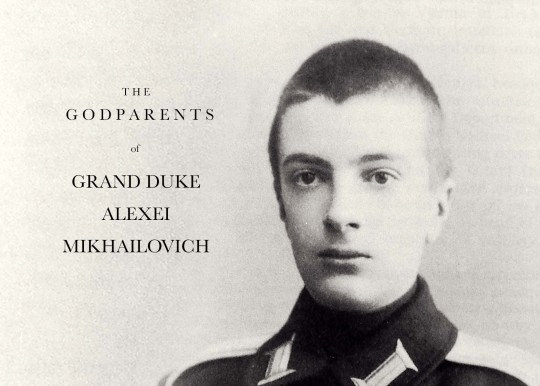
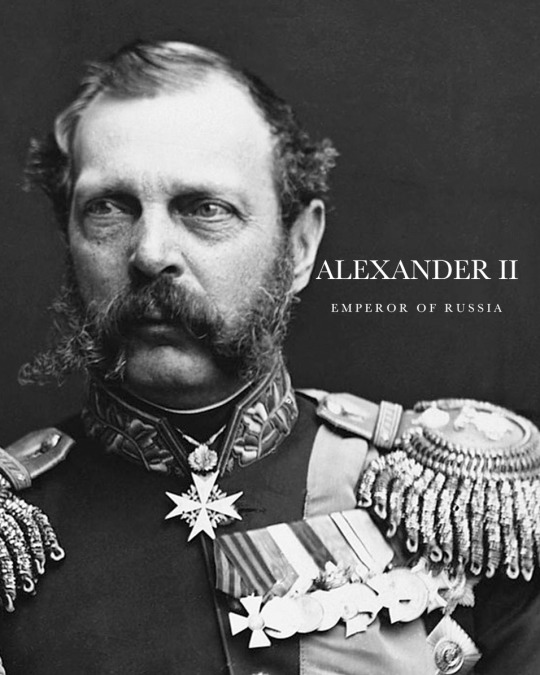
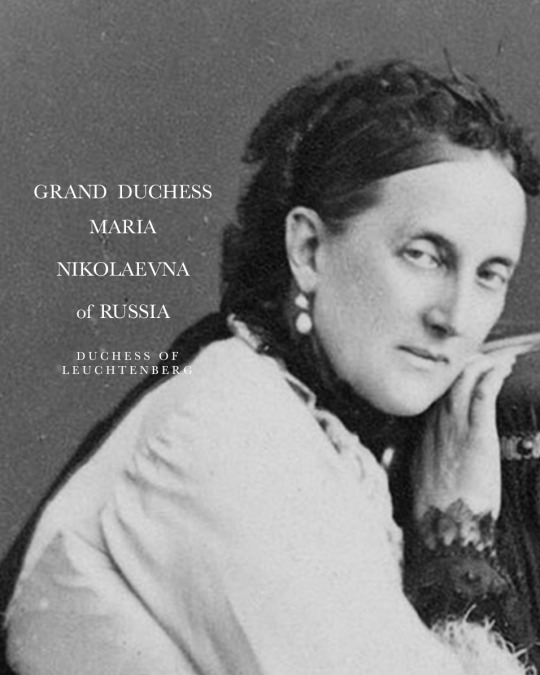
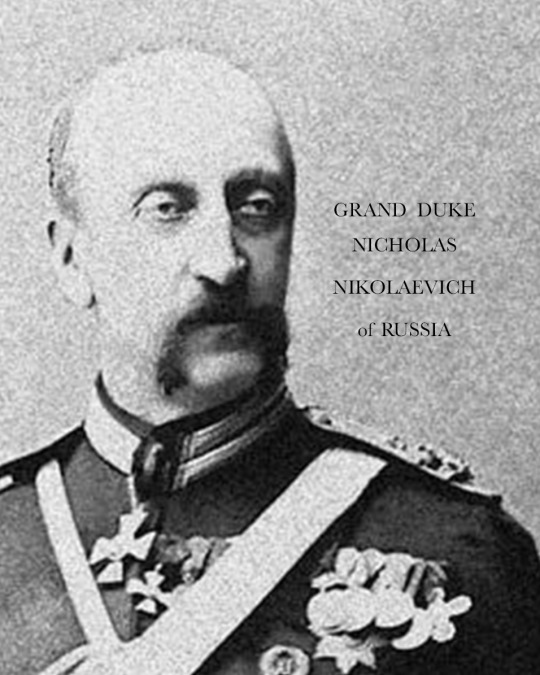

GODPARENTS OF GRAND DUKE ALEXEI MIKHAILOVICH
Grand Duke Alexei Mikhailovich was born on 28 December 1875 in Tbilisi, Tbilisi Governate, Russian Empire (now Georgia). He was the the sixth son and youngest child of Grand Duke Michael Nikolaevich of Russia, himself the youngest son of Emperor Nicholas I. He was the only Grand Duke to bear the name and patronymic of a Tsar: Alexei Mikhailovich. On 11 January (New Style) 1876, he was christened at Tbilisi by the Palace Priest and Confessor of Their Imperial Highnesses. He had seven godparents, as listed:
ALEXANDER II, EMPEROR OF RUSSIA - his uncle, the Russian Emperor stood as one of the godparents. He became the Emperor of All Russia in 1855. Alexander’s most significant reform as emperor was the emancipation of Russia’s serfs in 1861, for which he is known as Alexander the Liberator.
GRAND DUCHESS MARIA PAVLOVNA OF RUSSIA, GRAND DUCHESS CONSORT OF SAXE-WEIMAR-EISENACH - his aunt was one of his godparents. One of the daughters of Emperor Paul I, the grand duchess married a German prince Karl Friedrich, Grand Duke of Saxe-Weimar-Eisenach in 1804. She was an intellect, interested in both arts and sciences. German poet and novelist Johann Wolfgang von Goethe hailed her as one of the worthiest women of his time. She was the great-grandmother of Wilhelm II, German Emperor and Queen Victoria of Sweden.
GRAND DUKE NICHOLAS MIKHAILOVICH OF RUSSIA - his uncle, was one of his godparents. Trained for the military, as a Field Marshal he commanded the Russian army of the Danube in the Russo-Turkish War, 1877–1878.
GRAND DUCHESS MARIA PAVLOVNA OF RUSSIA - known as 'Maria Pavlovna the Elder', was the wife of his first cousin Grand Duke Vladimir Alexandrovich, and stood as one of his godparents. Born as Duchess Marie of Mecklenburg-Schwerin, her ancestors included Emperor Paul I of Russia. Upon her marriage to the grand duke, she became a prominent hostess in Saint Petersburg.
GRAND DUKE ALEXEI ALEXANDROVICH OF RUSSIA - his first cousin and namesake, one of the sons of Emperor Alexander II, was one of his godparents. Chosen for a naval career, Alexei Alexandrovich started his military training at an early age. By the age of 20 he had been appointed lieutenant of the Imperial Russian Navy, eventually becoming general-admiral.
GRAND DUCHESS ANASTASIA MIKHAILOVNA OF RUSSIA, GRAND DUCHESS OF MECKLENBURG-SCHWERIN - his sister, was one of his godparents. In 1879, when Alexei Mikhailovich was only four years-old, his only sister married a German prince, Friedrich Franz III of Mecklenburg-Schwerin (the elder brother of Grand Duchess Maria Pavlovna the Elder). Their children included Queen Alexandrine of Denmark and Crown Princess Cecile of Prussia. She was a strong-willed, independent and unconventional woman. She never became used to her new country where she was unpopular.
GRAND DUKE MICHAEL MIKHAILOVICH OF RUSSIA - one of his older brothers stood as another of his godparents. As Romanov tradition demanded, he followed a military career. He served in the Russo-Turkish War in 1877, became a Colonel and was adjutant at the Imperial court. In 1891 he contracted a morganatic marriage with Countess Sophie von Merenberg, a morganatic daughter of Prince Nicholas William of Nassau and a granddaughter of the Russian poet Alexander Pushkin. For contracting this marriage without permission, their first cousin Emperor Alexander III stripped him of his military titles and banished the couple from the Russian Empire. Alexei Mikhailovich never saw his brother again after his banishment.
Source
#alexei mikhailovich#romanovs#history#alexander ii#maria pavlovna the younger#maria nikolaevna#nicholas nikolaevich#alexei alexandrovich#anastasia mikhailovna#michael mikhailovich#godparents
23 notes
·
View notes
Text
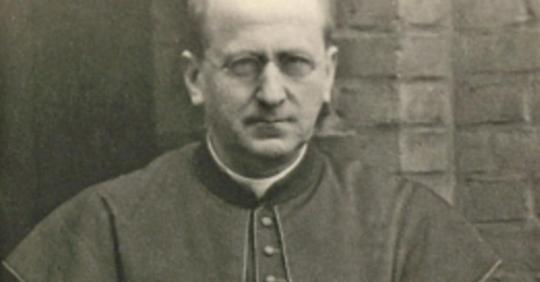
Brave German Priest
Beatified by John Paul II
Father Bernhard Lichtenberg was a German Catholic priest who defied the Nazi regime and paid a heavy price.
Born in Prussia in 1875, Father Bernhard grew up among the Catholic minority of a largely Protestant city. He was ordained as a priest in 1899 and served as a military chaplain during World War I. He served in several parishes in Germany. As the Nazis rose to power in the 1930’s, he was assigned to St. Hedwig’s Cathedral in Berlin.
During the Kristallnacht pogrom of November 1938, German churches kept quiet, and most Christian clergy stood idly by. Father Bernhard was the only Catholic priest in Berlin who spoke out publicly against the atrocity. His voice grew louder in 1939, when the Third Reich began implementing a merciless child euthanasia program, in which disabled children were secretly killed by the thousands. Horrified, Father Bernhard went to Nazi headquarters and vehemently protested the euthanasia program. Nazi officials laughed at him. He wrote a letter to the Chief Physician of the Reich, saying “I, as a human being, a Christian, a priest, and a German, demand of you, Chief Physician of the Reich, that you answer for the crimes that have been perpetrated at your bidding, and with your consent, and which will call forth the vengeance of the Lord on the heads of the German people.” Over 200,000 people were killed in the euthanasia program.
Father Bernhard often preached from the pulpit against the Nazi regime. He prayed publicly every day for Jews and other victims, and ended every mass with a prayer for the Jews of Germany. Two female students heard him pray publicly for Jews that had been sent to concentration camps, and denounced him to the police. In 1941, Father Bernhard was arrested by the Gestapo. He refused to disavow his moral objections to the Reich. Father Bernhard was imprisoned for two years, enduring terrible conditions and physical abuse. In 1943, he was transferred to Dachau. He died in a cattle car on his way to the camp. He was 68 years old.
In 1996, Father Bernhard was beatified by Pope John Paul II and declared a Blessed Martyr. The beatification ceremony was held in the Olympic Stadium in Berlin. He was honored as Righteous Among The Nations by Yad Vashem, the official Holocaust Memorial of Israel, in 2004.
For his profound moral courage at the cost of his life, we honor Blessed Father Bernhard Lichtenberg as this week’s Thursday Hero.
Accidental Talmudist
28 notes
·
View notes
Text
Random thought: Priest/Demon Frying Pangle AU where Prussia is the Priest and AusHun are the demons but they aren't competing to make Gilbert give up. They're joining forces.
40 notes
·
View notes
Text
From what I've heard, the first mate on a ship can officiate a wedding.
Captain Kirkland's first mate notices something between the captain and the noisy priest Beilschmidt (who ended up on board for...reasons), so he keeps hinting at taking the relationship to what he thinks is the next level.
___
First mate: Let me know if you need me to do any extra jobs, say, for an event.
Arthur: An event?
First mate: That's right, like – and this is just an example – but say you were to get married. I can officiate the wedding! I know we have an actual priest on board, but well, he might be busy doing...other things you asked him to do.
#hetalia#aph#hws#aph england#hws england#arthur kirkland#aph prussia#hws Prussia#gilbert beilshmidt#pirate england#captain kirkland#priest Prussia#pirate x priest
15 notes
·
View notes
Photo

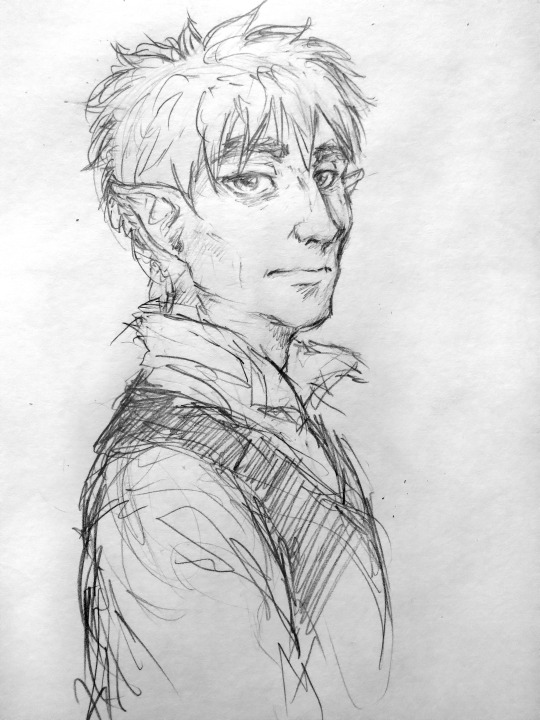




legendary version of our dnd characters...
...or dnd-AU for hetalia, as you wish
1. Sigurd (Norway) - wizard-dragon (silver) who destroyed half of the continent;
2. Arthur (England) - half-elf wizard with great ambitions and an even greater love for fairy tales;
3. Gunther (2p!Prussia) - ancient elven warlock with a thousand secrets;
4. Henrik (Denmark) - human barbarian of dragon totem (you know which dragon);
5. Francesca (nyo!France) - high priestess of the god of beauty and no one knows what she really looks like under the illusions;
6. Cornelius (2p!Rome) - high priest of the god of law without empathy and morality
#aph#hetalia#axis powers hetalia#au#dungeon and dragons#and#aph norway#aph england#arthur kirkland#2p#2ptalia#2p!prussia#aph prussia#aph denmark#nyotalia#nyo!france#aph france#aph rome#2p!rome
36 notes
·
View notes
Note
hetalia rp!
looking for: pruk and german bros!
i am 24 and am looking for someone 20+ to roleplay with me. for pruk i'd prefer to write prussia, but for german bros i am not picky, and i certainly wouldn't mind playing germany!
for pruk i'd love to do a priest!prussia & pirate!england plot, either humanverse or nationverse works for me!
for german bros i don't have a set plot yet, but i'd love to figure out something with you. i'm just feeling them recently, idk.
i rp over discord! like this post and i'll reach out to you.
-
3 notes
·
View notes
Text
i have a mega old CRACK-ish idea of prussia talking with the order of malta (hospitaller) in the outdoor seating of some coffee shop in berlin. so, picture a weird guy in hoodie and jeans talking to an actual catholic priest using formal clothes including a clerical collar.
friendly bickering / catching up is interrupted by them seeing a glimpse of molossia, who hides again as soon as he's spotted (i often assume nation-people insta recognize each other). he doesn't want to go close to the to old af former knights, but sealand and ladonia that are there as well keep reminding him too loud that molossia is technically at war with east germany.
prussia and the order of malta pretend they didn't see or hear the micronations, but eventually molossia goes near followed by sealand and ladonia, after being pestered by the kids for too long. seborga and wy (the ones with common sense) this time are not near or are too late to stop them.
...a war declaration later, an amused prussia reminds molossia that he's __ years late (reunification), unless he wants to declare war to (west) germany: "who's this much taller than me..."--hovers hand over his head--"...and this much muscular than me"--hovers hand over one of his biceps.
of course sealand and ladonia are like "yes, you can win against germany! we'll root for you (from a secure distance)!", but molossia (freaking out at that idea) pulls out the ernst thälmann island card.
"cuba said that was just symbolic."
oh.
(grinning, tilting head to a side) "still wanna fight my brother? or me?"
order of malta: "gilbert, i thought you were a changed man..."
--prussia shushes him. "not your business!" he says yet he can't contain his laughter--
(cont.) to molossia: "...you don't want to fight either of them, kid."
the older personifications end up inviting the micronations to the table, the war declaration being obviously a joke or symbolic after all. in the middle of it, prussia pulls molossia from the arm to whisper in his ear:
"if turns out i am still alive for stupidest reason, i'm beating the shit out of you and your boss."
he pushes molossia away, and continue talking with the others like nothing. the order of malta squints at prussia, shaking his head, imagining the kind of bullshit prussia just told to the poor kid.
#my narrator voice is 100% dead at the moment so have this#hetalia#hws prussia#hws molossia#hws hospitaller#fic wip#fic wips#sr. tnddr
13 notes
·
View notes
Text
reading about the iron kingdom in xvi lore and, in actual history, there was a territory known as the iron kingdom; prussia ( although no longer a political entity, it contained parts of germany, poland, and russia ). according to the xvi wiki, the political climate of the fictional iron kingdom was that of a monarchy, but basically only in name as much of the power was derived from the crystalline orthodoxy and its head priest.
i say this because i feel like it parallels a lot with the political struggle between the tsar and r.asputin, whom the tsarina took great favour with and whom was ultimately the downfall of the r.omanovs' reputation in the eyes of the people.
so basically i could, in theory, put the r.omanovs as the reigning monarchy in the iron kingdom and r.asputin could be one of the priests following the crystalline orthodoxy.
6 notes
·
View notes
Note
Romano!! (For the blorbo post, please!)
YOU

My thoughts on Romano/South Italy:
As I said in my Hetalia slideshow, he's the "Pathetic Cringefail Malewife (Angry)". Romano's the direct inheritor of Rome's legacy, but Veneciano's the one who actually got all the gifts. He's got the skeletal remains of his grandpa's legacy, an idiotic artsy brother who fortune keeps smiling upon, and to top it off, he's got a pretty abrasive and pessimistic personality. To me, he's got a super interesting character as being *half* of a united nation right now, which is something we haven't seen at all in canon aside from the "Prussia is East Germany" headcanon that you see floating around. That being said, even with all that "Heir and the Spare" stuff going around with him and Veneziano, he's one half of a whole idiot. He's rude, he's a womanizer, he'll run you over if you're not a priest. He makes amazing food and takes great care of his plants, but by god do not ask him to be organized or efficient. He's a peak disaster and I love him so much.
Ask Game
#ask game#bramble rambles#tayberry text#acai asks#aph south italy#i have so many thoughts on him and veneziano#like. so so many.#i didn't care about veneziano and then i Did and everything changed#romano's always been a fave of mine though
10 notes
·
View notes
Note
The first time I heard someone talk about Prussia it was over a skype call. I thought they were talking about Persia. I made the Prussia roleplayer in our group cry.
I feel like a priest in a confessional.
4 notes
·
View notes
Text
Soult on Rügen, April 1808
After the peace of Tilsit in July 1807, history books will immediately follow Napoleon back to Paris and continue their story with Napoleon getting involved on the Iberian peninsula, first in Portugal, then in Spain. After all, events in Poland and Prussia had come to an end.
Or had they? Actually, several French army corps were still occupying most of Prussian territory, and would do so until the Prussian government had fulfilled the obligations resulting from the peace of Tilsit. Which became quite a struggle, with Prussians unwilling to pay and Napoleon interpreting individual articles very much in his own favour.
The guy to oversee this struggle was, you’re guessing it, one Jean-de-dieu Soult. Why not make use of a learned notary among your marshals, right? (Okay, almost learned notary. At least he would have been one if he hadn't jumped out of his master's window early one morning to run away. - What the heck, that would do for the Prussians!)
So, together with Mortier, Davout and Brune (I think), Soult stayed behind and became military governor for large chunks of what is today Germany and Poland. His position included many civilian functions, like negotiating border customs and a trade route for the Saxons through Prussia to the Duchy of Warsaw. He even had to install professors in German universities. Which probably led to him meeting, during one of the many journeys he made through the country he governed, one Ludwig Gotthard Kosegarten, the Lutheran preacher of Altenkirchen on Rügen, who like many priests had to work together with the French in daily life as the priests often were the single official authority left. Kosegarten in his writings describes the meeting as follows:
It was a sunny, mild day in April. I was sitting under the blossoming chestnut trees in front of my house next to good Captain Martin [of the French forces stationed in Altenkirchen], who was telling me about the vineyards and orchards his grandparents had left him in his fatherland, and which he was longing to see again; when a hussar came bustling up into the courtyard and brought greetings from General Grandjean, telling me at the same time that Marshal Soult was nearby, that they had decided to call on me, that everyone was starving, and that I was therefore being asked to provide breakfast. For my part, I was already too accustomed to visits of this kind to be particularly upset by the unexpected announcement. My captain, on the other hand, was beside himself. He believed he had to step up to the plate in this extraordinary event. He thought he had to defend the honour of our house in such an urgent case, and at the same time his own. Since he had already made the women in my family realise that their cooking was not up to much, […]
He had? This kinda makes me wonder how Mrs. Kosegarten may have felt about “good Captain Martin”.
[…] this time he personally took over the kitchen, called his faithful Le Roy, put on an apron, commanded the maids as if he were standing in front of his fusiliers, had eggs boiled, ribs roasted, macaroni fried, and prepared the sauces and salads himself; one would have sworn that the man's true place was in front of the hearth, not on the battlefield.
Look, it’s Soult. If there’s one thing to put him in what passes for a good mood in his case, it’s good food. The captain knows what he’s doing. Just make sure the bread is up to par, too!
In the meantime, the marshal arrived before I had time to change my housecoat for something more suitable. A host of commanders, division and brigadier generals, adjutant majors and aide de camps accompanied him. There was General Compans, the head of the Etat major, Molitor, who commanded at Stralsund, Grandjean, who commanded at Rügen; the other names have slipped my mind. I cannot say anything but that these men approached me with all the urbanity [i.e.: civility] imaginable. There was not one of them who did not know to tell me something special and obliging.
The marshal was venerable to me. Broken by wounds, he could only hold himself up with difficulty. I found him cordial and simple. In view of the Swiss landscape paintings hanging on the walls, he talked of the campaigns he had made in those regions, and thought he recognised some of them in the paintings.
And as Kosegarten does not mention anything about their disappearance, it seems they even were still on his wall when Soult left. 😁
Compans had slashed a finger in the ferry boat, which hurt him; he asked if I knew any advice. I then found a strip of band-aid, which I put on, insisting that the Emperor should not find out about it, because it was English goods. Molitor told the marshal about the prayer house I had undertaken to build on Arkona; the marshal demanded to see the subscription list; he also wanted to sign it, he said; I was sorry not to have the list at hand; I promised to send it to him later. Breakfast was now served. My captain entered, completely stunned with awe; one might have thought that the Emperor himself was present …
At table, everything was quite cheerful, and the hungry warriors, who had, of course, travelled all night and had been fasting since last evening, were quite pleased with what the captain had prepared. The marshal, who ordinarily looked very serious and almost sour [...]
Almost??? - Look, I really like the guy, but he usually made a face as if he was about to devour somebody alive or had just done so and was suffering from severe digestive problems because of it. - Sorry for the interruption. So, the marshal [...]
[…] (he is also said to be a strict man in matters of the service), grew more and more open and cheerful. He had just read Chateaubriand's latest work, The Spirit of Christianity, and talked to me about it intelligently and accurately. Then he spoke of his wife, who was German, and showed much affection for our people. He also spoke of the Emperor, to whom he seemed sincerely attached, something I had hitherto rarely noticed in these French military leaders …
Obviously, you’ve never met Lannes or Davout.
After dinner, the Marshal expressed a wish to see my family. My wife asked to be excused.
Thank you. I can do without meeting the guy for whom my cooking wasn’t good enough.
But the children had to come in, no matter how much they resisted. Gottfried stood there quite defiantly, maltreating the Marshal and Duke as Monsieur; he hardly even acknowledged him when he was asked a few questions about Geneva and Paris, for [the marshal] had heard that the boy had been there. The men took great delight in my daughters, whose blossoming beauty, touching grace and sweetness opened the hearts of these defiant, scarred warriors, and brought a tear to the eye of the already ageing marshal, […]
[…] who cannot have been older than 39 when this took place […]
[...] who had grown stiff with bloody work, and who was thinking of his own children when he met them. Of course, they then had to show off what they had learned, their little bit of piano playing, and what they had scribbled together with a quill, of foliage, trees and flowers. Many kind things, as can easily be guessed, were said to them, especially to the smaller, stupider one, who was much closer to crying than to laughing ...
Most of the day passed in this way. The carriages were finally prepared, and to my not insignificant relief. The marshal did not fail to offer me his services in parting; in the customary way, of course; but there was something in his tone and manner which seemed to indicate that he was serious about what he was saying. He thought he had noticed, he said, that neither I nor my children were in their rightful place here; he would be pleased to see a man of merit brought out of obscurity; if he could contribute to this as long as he had to administer the rights of the sovereign in the province, he would do so with eagerness, and in this case he expected my letters .... I cannot say that the Marshal's well-meant remarks were particularly to my taste. Of course, it was not possible to communicate with him about the concepts of celebrity and obscurity, of the outer world and the inner world, of happiness and enjoyment of life. I then contented myself with asking for the preservation of such favourable attitudes ... and away they went.
This was not really the end of the story, however. Despite his hesitations, Kosegarten would soon write that letter to Soult, asking for and receiving a position of professor at Greifswald University, that he kept until his death, even after the fall of the Premier Empire.
23 notes
·
View notes
Text



Priest Prussia with piercing cuz I say so.
literally paused my final exam just to draw him cuz priorities ✨
13 notes
·
View notes